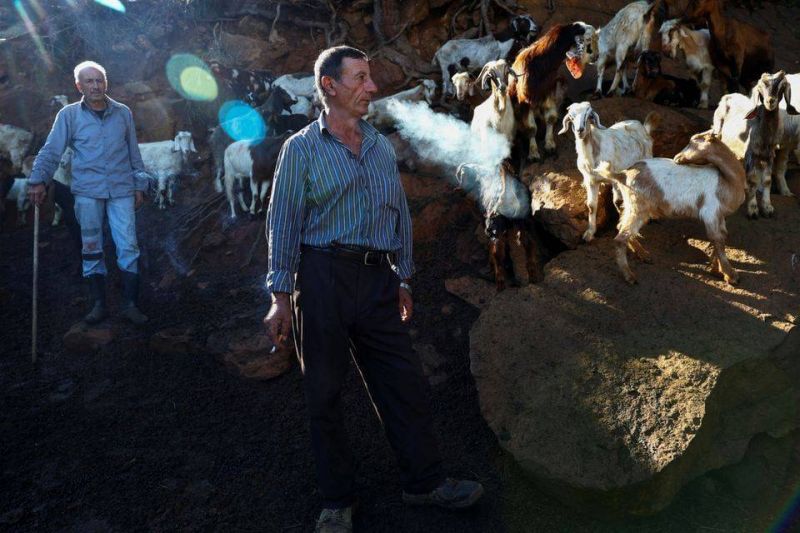
Lebanese shepherd, Tony al-Amil, smokes a cigarette as he stands near his livestock which he had to move from his hometown of Rmeich in southern Lebanon to the outskirts of Beirut due to ongoing cross-border hostilities between Hezbollah and Israeli forces, in Fanar, Lebanon, Nov. 16, 2023. (Credit: Esa Alexander/Reuters)
MAJDAL SELM, Lebanon — For centuries, the rolling pastures of southern Lebanon provided perfect grazing grounds for local shepherds' flocks. But now they are off-limits, rendered too dangerous for sheep, cows, and their herders by Israeli air raids and artillery fire.
"All of us shepherds take our herds to [the border areas of] Mais al-Jabal, Houla ... but with the shelling, you can't get anywhere near there," said Ali Beber, with his flock of 350 sheep.
They are now squeezed into a corrugated metal pen in the town of Majdal Selm, about seven kilometers west of their usual grazing spot.
Beber, 57, walks them briefly every day but has had to buy haystacks to feed them — at a cost of around $2,000.
"This isn't cheap. I had prepared hay for them so they could eat during winter, but that was meant for rainy days," he said.
"The hay I have left can feed them for another two or three days, then I'm going to have to go into debt to get them food."
Fighting broke out in Lebanon shortly after Israel began its bombardment of the besieged Gaza Strip, following Hamas' violent Oct. 7 surprise attack. Since then, Lebanese Hezbollah, an ally of Hamas, fires rockets at Israel on a daily basis and Israel retaliates with air strikes and artillery shells.
The resulting fires have burned olive trees and torched agricultural land across southern Lebanon, devastating herders and farmers already hit hard by a four-year economic meltdown. A recent statement from Lebanon's caretake Minister of the Environment revealed that 37 percent of the land consumed by forest fires this year was the result of white phosphorous shelling from Israel. The use of white phosphorous is prohibited against civilians and causes serious health consequences.
Jihad Said, 45, told Reuters he moved his herd to the town of Rmeich after losing three cows to Israeli shelling earlier this month on a farm on the outskirts of the town.
Two Lebanese shepherds were also found dead after being shot at by Israeli troops earlier this month.
Lebanese herders have long learned to live with the cross-border tensions between Lebanon and Israel. Those who venture too close to the border are often questioned for hours by the Israeli military. Beber said he had been detained by Israel twice.
A month-long war between Israeli forces and Hezbollah in 2006 also hit farmers hard. It prevented Tony al-Amil from harvesting five hectares of wheat and barley, he told Reuters.
This time around, he stayed in the south for the first two weeks of shelling - but then took his 100 sheep to the edges of Beirut.
"If [the war] ends tomorrow, I'll go back tomorrow. Otherwise I’m going to stay here, I have nowhere else to go."
pastures of southern Lebanon provided perfect grazing
grounds for local shepherds' flocks. But now they are off-limits, rendered too dangerous for sheep, cows, and their
herders by Israeli air raids and artillery fire.
"All of us shepherds take our herds to [the border areas of] Mais al-Jabal, Houla ... but with...